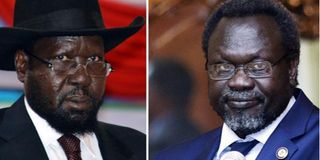UN to advise South Sudan on best practice for polls preparations

President Salva Kiir and his rival, Vice President Riek Machar. Despite optimism from government operatives, South Sudan faces challenges in holding credible and peaceful elections and may need external support.
What you need to know:
- Despite optimism from government operatives, South Sudan faces challenges in holding credible and peaceful elections and may need external support in areas such as election administration, security, voter education and outreach, and dispute resolution.
The United Nations has finally agreed to provide South Sudan with technical assistance to hold elections in December 2024, even though doubts remain on whether the timelines are workable.
On January 28, the head of the United Nations Mission in South Sudan (Unmiss), Nicholas Haysom gave an undertaking that the global body will advise and assist with best practices for technical preparations for elections in South Sudan.
“I can confirm that the UN received the formal invitation from the government to assist in the election process. This is significant because it authorises the United Nations to advise and assists with best practice for the technical preparation for the elections,” said Mr Haysom, who clarified that the offer does not mean that it will be conducted by the UN, but will be a South Sudanese-administered poll with UN support.
The South Sudan Permanent Representative to the African Union (AU), James Morgan, who is also the ambassador to Ethiopia, said that South Sudan has always been ready to hold elections as a means of denying “trouble makers’ the fodder to claim that the government of President Salva Kiir is clinging to power.
Make elections possible
"South Sudan needs peace, security, and stability that's why we are trying our level best to make elections possible in 2024. But it is better to take a step forward rather than never. Let's see how it will play out because it must be done,” said Mr Morgan.
South Sudan has never held an election since the country gained independence in July 2011 and lacks the institutions and capacity for such an undertaking.
Despite optimism from government operatives, South Sudan faces challenges in holding credible and peaceful elections and may need external support in areas such as election administration, security, voter education and outreach, and dispute resolution.
Serious doubts
Leader of the holdout group, the Nation Salvation Front Gen Thomas Cirillo said there are serious doubts whether the elections will take place given that most important provisions to hold a credible free and fair elections were not implemented and may not be done.
“And if they decided to conduct it, then that means they will rig the elections which will not be accepted by the people and will not be good for peace,” said Cirillo.
Prior to the elections, the country is supposed to hold a national census, delimitation of the constituencies, create a new voter-register and facilitate the return of the refugees in the neighbouring countries of Kenya, Uganda, Ethiopia and Sudan
The country needs assistance with voter registration systems to accurately record and manage voter information in a country of 12 million. The people last voted in the January 2011 referendum, in favour of independence from Sudan.
“As moral guarantors and partners of that agreement, our collective task is to ensure that the parties have the best possible international support to help them fulfil their commitments to the people of South Sudan,” said Mr Haysom.
Reconstitute polls commission
One of the first steps is to reconstitute the National Elections Commission which has remained dormant for over 10 years.
The country also needs to finalise the legal and technical arrangements, as the National Constitutional Amendment Committee (NCAC) has reviewed the Elections Act and incorporated election-related provisions into the constitution.
President Kiir in December signed the Constitution Making Process Bill, 2022 into law.
According to Chapter 1(5) of the September 2018 Peace Agreement, the Transitional Government of National Unity (TGoNU) was required to hold elections to establish a democratically elected government, 60 days before the end of its term.
The elections, according to the agreement, were due in December 2022, but the parties to the agreement in August agreed to extend the transition period for two years thus pushing the elections to December 20, 2024.




